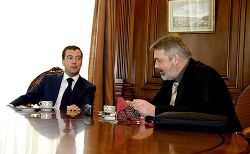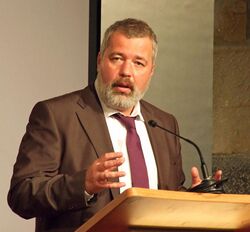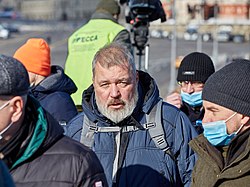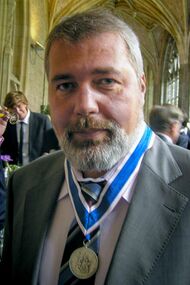Biography:Dmitry Muratov
Dmitry Muratov | |
|---|---|
Дмитрий Муратов | |
 Muratov in 2018 | |
| Born | Dmitry Andreyevich Muratov 29 October 1961 Kuybyshev, Russian SFSR, Soviet Union (now Samara, Russia) |
| Citizenship | Russia |
| Education | Kuybyshev State University (BA) |
| Occupation |
|
| Years active | 1987–present |
| Employer | Novaya Gazeta |
| Political party | Yabloko |
| Awards | Order of Friendship, Order of Honour, CPJ International Press Freedom Awards, Legion of Honour, Order of the Cross of Terra Mariana, World Association of Newspapers' Golden Pen of Freedom Award, 2021 Nobel Peace Prize |
| Website | novayagazeta |
Dmitry Andreyevich Muratov (Russian: Дмитрий Андреевич Муратов; born 29 October 1961) is a Russian journalist, television presenter and the editor-in-chief of the Russian newspaper Novaya Gazeta.[1] He was awarded the 2021 Nobel Peace Prize jointly with Maria Ressa for "their efforts to safeguard freedom of expression, which is a precondition for democracy and lasting peace."[2]
Muratov co-founded the pro-democracy newspaper Novaya Gazeta in 1993 with several other journalists. He was the newspaper's editor-in-chief from 1995 to 2017, and again assumed the position in 2019. The newspaper is known for its reporting on sensitive topics such as governmental corruption, human rights violations,[3] electoral fraud, police violence, and other misuses of power.[4] As editor-in-chief he was a vocal advocate for an independent press[4] and published articles by Anna Politkovskaya that scrutinised the Putin administration. Muratov helped to create "the only truly critical newspaper with national influence in Russia today", according to the Committee to Protect Journalists.[5] During the Russian invasion of Ukraine; on 28 March 2022, the newspaper announced that it would suspend its online and print activities after it received a second warning from Roskomnadzor.[6]
In April 2022, the second largest Norwegian media group Amedia announced it was handing over its four printing houses in Russia worth some 4 million Euro to Muratov, as it was ceasing its business activities in Russia.[7]
On 1 September 2023, Muratov was declared by the Russian authorities to be a "foreign agent".[8]
Early life and education
Dmitry Muratov was born on 29 October 1961 into a Russian family in the city of Kuibyshev (officially known since 1991 by its original name, Samara).[9][10] He studied at the Faculty of Philology at Kuibyshev (now Samara) State University for five years, where he discovered his interest in journalism. While in college he made contact with local newspapers and held a part-time job in journalism.[11]
From 1983 to 1985, after graduating from university, he served in the Soviet Army as a communication equipment security specialist.[11][12]
Early career
In 1987, Muratov began working as a correspondent for Volzhsky Komsomolets newspaper. His superiors were so impressed that by the end of his first year he was appointed to head of the Komsomolskaya Pravda youth department, and later was promoted to editor of news articles.[13] Muratov left Komsomolskaya Pravda in 1992.[14]
Novaya Gazeta
In 1993, Muratov and 50+ other colleagues from Komsomolskaya Pravda left to start their own paper titled Novaya Gazeta. Their goal was to create a publication that was "an honest, independent, and rich"[15] source for the citizens of Russia. The newspaper’s mission is to conduct in-depth investigations into human rights issues, corruption and abuse of power. Novaya Gazeta's newsroom started out with two computers, two rooms, one printer and no salary for the employees. Former Soviet President Mikhail Gorbachev donated some of his Nobel Peace Prize money to pay for salaries and computers for the paper. Muratov helped to create Novaya Gazeta, where he was named Deputy Press Editor.[16]
In December 1994 – January 1995, Muratov was a correspondent in the war zone of the First Chechen War.[11][12] In 1995, he became the head of the editorial board. He held this position for over 20 years, stepping down in 2017, citing the exhausting nature of running the paper.[17] In 2019, he returned to the position, after the paper’s staff voted for his return.[16][18]
Muratov often reported on sensitive topics including human rights violations, high-level government corruption, and abuse of power. His political beliefs, such as supporting freedom of press, has led to conflict with fellow journalists and the government.[5]
In 2004, the newspaper printed seven articles by columnist Georgy Rozhnov, which accused Sergey Kiriyenko of embezzling US$4.8 billion of International Monetary Fund funds in 1998 when he was Prime Minister of Russia.[19] The newspaper based the accusations on a letter allegedly written to Colin Powell and signed by U.S. Congressmen Philip Crane, Mike Pence, Charlie Norwood, Dan Burton and Henry Bonilla and posted on the website of the American Defense Council.[20] The newspaper claimed that Kiriyenko had used some of the embezzled funds to purchase real estate in the United States. It was later claimed that the letter was a prank concocted by The eXile.[20] In response, Kiriyenko sued Novaya Gazeta and Rozhnov for libel, and in passing judgement in favour of Kiriyenko the court ordered Novaya Gazeta to retract all publications relating to the accusations and went on to say that the newspaper "is obliged to publish only officially proven information linking Mr Kiriyenko with embezzlement."[19]
After Novaya Gazeta published an investigation by journalist Denis Korotkov about Russian businessman Yevgeny Prigozhin,[21] in October 2018, Denis Korotkov and the editor-in-chief at Novaya Gazeta were the target of threatening deliveries of a severed ram's head and funeral flowers to the paper's offices. The style of the threat resembled others by Kremlin-linked Yevgeny Prigozhin.[22]
In 2016, the newspaper was involved in the publishing of the so-called Panama Papers, confidential documents from a Panama-based law firm that had assisted companies and individuals from around the world in hiding their wealth.[4]
His newspaper has been influential on shedding light of the turbulent situations in Chechnya and the Northern Caucasus in general. Novaya Gazeta published reports about anti-gay purges in Chechnya in 2017, where three men were allegedly killed, and dozens detained and intimidated. After publication, the Chechen Government denied the existence of persecutions in the Republic.[23]
The newspaper published the report by Elena Milashina and the list of 27 Chechens killed on 26 January 2017. The newspaper also addressed the report and the list to the Russian government's Investigative Committee of Russia, and asked the committee to investigate the data in the published list. While Novaya Gazeta listed the names of 27 Chechens killed, the newspaper suspected that real number might be even more, with up to 56 Chechens killed that night. The newspaper said that the dead Chechens were citizens of the Republic of Chechnya, who were detained by the governmental security service, put in custody inside a secure compound belonging to the traffic police regiment in the City of Grozny, and executed on 26 January by gunfire (several men brutally killed by asphyxiation)[24]) by state security forces without any legal proceedings.[25]
During Muratov's time at the Novaya Gazeta, six of its journalists have been killed.[5] In 2000, Igor Domnikov was murdered in a Moscow apartment building. In 2001, Victor Popkov, a Novaya Gazeta contributor, died after being wounded in the crossfire of a gunfight in Chechnya.[5] In 2003, Yury Shchekochikhin was poisoned after investigating a corruption scandal where high-ranking Russian officials were involved.[5] Anna Politkovskaya was assassinated in her apartment block in 2006 after spending her career covering Chechnya and the Northern Caucasus.[5] In 2009, Anastasia Baburova was shot and killed on the street, while Natalia Estemirova was abducted and murdered.[26]
After the Russian invasion of Ukraine on 24 February 2022, Muratov released dual editions of his newspaper in both Russian and Ukrainian, and said that his newspaper would defy the Russian media watchdog's rules which he stated would lead to a situation in which only Russian government statements could be reported.[27] On 4 March 2022, Russian President Vladimir Putin signed into law a bill introducing prison sentences of up to 15 years for those who publish "knowingly false information" about the Russian armed forces and their operations, leading to some media outlets in Russia to stop reporting on Ukraine or shutting their media outlet.[28] It introduced criminal liability for the dissemination of "knowingly false information" about the actions of the Russian Armed Forces, with the Russian Federation deciding what is the truth, "in order to protect the interests of the Russian Federation and its citizens and maintain international peace and security".[29][30][31] As of December 2022, more than 4,000 people were prosecuted under "fake news" laws in connection with the war in Ukraine.[32]
On 28 March 2022, the newspaper suspended its print activities after receiving a second warning from Roskomnadzor;[6] on 6 April 2022, a foreign version of the paper (Novaya Gazeta Europa) was launched from Riga in order to avoid censorship.[33]
In December 2022, Muratov said that while Russia can "destroy" Ukraine's infrastructure, "it will never be able to conquer it".[34] In March 2023, he predicted that there would never be "normal relations between the people of Russia and Ukraine" because "Ukraine will not be able to come to terms with this tragedy." He also said that "In Russia political repression will continue against all opponents of the regime" and that the only hope he has "lies with the young generation; those people who sees the world as a friend, not as an enemy".[35] He warned that Russian state propaganda "is preparing people to think that nuclear war is not a bad thing."[35] Russian nationalist Telegram channels supporting the war in Ukraine accused Muratov of being pro-Ukrainian.[36]
In March 2023, Oleg Orlov, co-chair of the Nobel Peace Prize-winning human rights group Memorial, was detained on charges of "repeatedly discrediting the armed forces".[37] At the hearing, he was accompanied by Dmitry Muratov, who said that Orlov was being tried "for observing the Russian Constitution" which, he argued, guarantees freedom of expression.[38]
Attack on train
On 7 April 2022, Muratov was attacked by an unknown person and covered with red paint mixed with acetone while on a train from Moscow to Samara, supposedly as an act of support for Russian troops;[39][40] According to U.S. intelligence agencies, the attack was organized by Russian intelligence services.[41]
Awards and honours
Muratov is a decorated journalist who has received numerous awards and honours for his contributions to his craft. He received the CPJ International Press Freedom Award in 2007 from the Committee to Protect Journalists for his bravery in defending the freedom of the press in the face of danger.[42] On 29 January 2010, he was acknowledged by the French government for his devotion to the freedom of journalists. He was given the Legion of Honour order; France’s highest civil decoration.[43] Muratov traveled to the Netherlands in May 2010 to receive the Four Freedoms Award for the Novaya Gazeta.[44] In 2016, Muratov accepted the Golden Pen of Freedom Award from the World Association of Newspapers and News Publishers.[5]
Muratov was awarded the 2021 Nobel Peace Prize, alongside Maria Ressa of the Philippines, "for their efforts to safeguard freedom of expression, which is a precondition for democracy and lasting peace."[2] The Nobel Committee specifically commended Novaja Gazeta's "critical articles on subjects ranging from corruption, police violence, unlawful arrests, electoral fraud and 'troll factories' to the use of Russian military forces both within and outside Russia."[45] The Nobel Prize Committee was criticized for rewarding Muratov and not jailed Russian opposition leader Alexei Navalny, as an attempt by the Committee "to keep the maximum distance from the current political process" in Russia.[46] Muratov is a member of the democratic political party Yabloko[47] that did not support the Smart Voting initiative by Navalny.[46] The Kremlin congratulated Muratov on winning the Nobel prize.[48] Muratov has said that he would have given the prize to Alexei Navalny if it were his choice.[49]
During his acceptance speech, at a time when Russia began a major military build-up near the Russia–Ukraine border, Muratov warned that "In [the] heads of some crazy geopoliticians, a war between Russia and Ukraine is not something impossible any longer."[50]
In an interview with Meduza, Muratov commented that his Nobel Prize belongs to all journalists of Novaya Gazeta who were killed for conducting their investigations:[51]
It's not mine. I'm not the right beneficiary, there are real ones. It's just that the Nobel Peace Prize isn't awarded posthumously, it's awarded to living people. Obviously, they decided to award it to someone living, having in mind Yury Shchekochikhin, Igor Domnikov, Anna Politkovskaya, Anastasia Baburova, Stanislav Markelov, and Natalya Estemirova.
On 22 March 2022, Muratov decided to sell his Nobel Peace Prize medal to an auction, donating the proceeds to UNICEF for the benefit of refugees from Ukraine.[52] The medal sold for US$103.5 million, the highest price ever recorded for a Nobel medal.[53][54]
Documentary
- 2023, The Price of Truth, by Patrick Forbes[55]
References
- ↑ "Главным редактором 'Новой газеты' стал Сергей Кожеуров". Novaya Gazeta. 17 November 2017. https://www.novayagazeta.ru/news/2017/11/17/137108-glavnym-redaktorom-novoy-gazety-stal-sergey-kozheurov.
- ↑ 2.0 2.1 "The Nobel Peace Prize 2021". https://www.nobelprize.org/prizes/peace/2021/summary/.
- ↑ "Dmitry Muratov, Editor of Novaya Gazeta, Russia". http://cpj.org/awards/2007/muratov.php.
- ↑ 4.0 4.1 4.2 "Dmitry Muratov". Encyclopædia Britannica. https://www.britannica.com/biography/Dmitry-Muratov.
- ↑ 5.0 5.1 5.2 5.3 5.4 5.5 5.6 Lundstrom, Hedvig (3 June 2016). "Biography of 2016 Golden Pen of Freedom Laureate Dmitry Muratov". https://archive.wan-ifra.org/articles/2016/06/03/biography-of-2016-golden-pen-of-freedom-laureate-dmitry-muratov.
- ↑ 6.0 6.1 "Russia's Novaya Gazeta newspaper pauses activities after official warning". 28 March 2022. https://www.reuters.com/world/europe/russias-novaya-gazeta-newspaper-pauses-activities-after-official-warning-2022-03-28/.
- ↑ "Norwegian media group Amedia leaves Russia, hands over presses to Novaya Gazeta editor-in-chief". https://interfax.com/newsroom/top-stories/77832/.
- ↑ "Russia Brands Nobel Winner Dmitry Muratov a 'Foreign Agent'". The Moscow Times. 1 September 2023. https://www.themoscowtimes.com/2023/09/01/russia-brands-nobel-winner-dmitry-muratov-a-foreign-agent-a82340.
- ↑ "Dmitry Muratov". Nobelprize.org. https://www.nobelprize.org/prizes/peace/2021/muratov/facts/.
- ↑ Bushuev, Mikhail (2021-10-08). "Who is Nobel Peace Prize laureate Dmitry Muratov?". https://www.dw.com/en/who-is-nobel-peace-prize-laureate-dmitry-muratov/a-59454159.
- ↑ 11.0 11.1 11.2 "Муратов, Дмитрий Главный редактор "Новой газеты"" (in ru). https://lenta.ru/lib/14160484/.
- ↑ 12.0 12.1 "Novaya Gazeta editor-in-chief dmitry muratov. Dmitry Muratov: biography, journalistic activities". 26 July 2019. https://amorlatinoamericano.ru/en/the-biggest/novaya-gazeta-glavnyi-redaktor-dmitrii-muratov-dmitrii-muratov-biografiya.html.
- ↑ "Dmitry Muratov: biografija, novinarske aktivnosti". https://hr.puntomarinero.com/dmitry-muratov-biography-journalistic-activities/.
- ↑ Yablokov, Ilya (8 October 2021). "Nobel peace prize: how Dmitry Muratov built Russia's 'bravest' newspaper, Novaya Gazeta" (in en). http://theconversation.com/nobel-peace-prize-how-dmitry-muratov-built-russias-bravest-newspaper-novaya-gazeta-169560.
- ↑ "Dmitry Muratov, Editor of Novaya Gazeta, Russia". https://cpj.org/awards/muratov-2/.
- ↑ 16.0 16.1 "Главным редактором "Новой газеты" вновь избрали Дмитрия Муратова". 15 November 2019. https://www.rbc.ru/technology_and_media/15/11/2019/5dce8fab9a7947c2d1c81745.
- ↑ "After 22 Years, Novaya Gazeta Editor Dmitry Muratov Steps Down". 13 November 2017. https://www.themoscowtimes.com/2017/11/13/novaya-gazeta-editor-steps-down-a59561.
- ↑ "Russian media veteran Dmitry Muratov returns to 'Novaya Gazeta' editor-in-chief post". https://meduza.io/en/news/2019/11/15/russian-media-veteran-dmitry-muratov-returns-to-novaya-gazeta-editor-in-chief-post.
- ↑ 19.0 19.1 Melnikov, Mikhail (17 October 2004). "III. Lawsuits against Journalists". Center for Journalism in Extreme Situations. http://www.cjes.ru/bulletin/?bulletin_id=1240&country=Russia&lang=eng.
- ↑ 20.0 20.1 Ames, Mark (22 July 2004). "Double Punk'd! Meta-Prank Goes Mega-Bad". The eXile. http://www.exile.ru/articles/detail.php?ARTICLE_ID=7406&IBLOCK_ID=35&phrase_id=9479.
- ↑ "Novaya Gazeta Report: 'Putin's Chef' Involved in Attacks, Killing". 22 October 2018. https://www.rferl.org/a/novaya-gazeta-reports-claims-of-putin-s-chef-involved-in-attacks-killing/29557806.html.
- ↑ Six red carnations and one severed ram’s head: Deadly threats sent to Russian independent newspaper, Global Voices, 18 October 2018
- ↑ Walker, Shaun (2 April 2017). "Chechen police 'have rounded up more than 100 suspected gay men'". https://www.theguardian.com/world/2017/apr/02/chechen-police-rounded-up-100-gay-men-report-russian-newspaper-chechnya.
- ↑ Милашина, Елена (23 July 2019). "Подвал имени Кадырова" (in ru). https://novayagazeta.ru/articles/2019/07/23/81341-kazarma-6.
- ↑ "Союз журналистов Чечни опубликовал обращение к "Новой газете"" (in ru). 11 July 2017. https://novayagazeta.ru/news/2017/07/11/133362-soyuz-zhurnalistov-chechni-opublikoval-otkrytoe-obraschenie-k-novoy-gazete.
- ↑ "Russian opposition newspaper will arm its journalists". 26 October 2017. https://www.theguardian.com/world/2017/oct/26/russian-opposition-newspaper-will-arm-its-journalists.
- ↑ "Prominent Russians join protests against Ukraine war amid 1,800 arrests". The Guardian. 2022-02-24. https://www.theguardian.com/world/2022/feb/25/prominent-russians-join-protests-against-ukraine-war-amid-1800-arrests-putin.
- ↑ "Putin Signs Law Introducing Jail Terms for 'Fake News' on Army". 4 March 2022. https://www.themoscowtimes.com/2022/03/04/putin-signs-law-introducing-jail-terms-for-fake-news-on-army-a76768.
- ↑ "Russia Blocks Facebook, Twitter; Moves Against "Fake" News About Ukraine War" (in en-GB). https://www.occrp.org/en/daily/16046-russia-blocks-facebook-twitter-moves-against-fake-news-about-ukraine-war.
- ↑ "Russia fights back in information war with jail warning" (in en). Reuters. 2022-03-04. https://www.reuters.com/world/europe/russia-introduce-jail-terms-spreading-fake-information-about-army-2022-03-04/.
- ↑ "Russia outlaws spreading 'fake news' about the Russian military with fines and prison" (in en-US). 2022-03-07. https://www.poynter.org/business-work/2022/russia-outlaws-spreading-fake-news-about-the-russian-military-with-fines-and-prison/.
- ↑ Weir, Fred (5 December 2022). "In Russia, critiquing the Ukraine war could land you in prison". CSMonitor.com. https://www.csmonitor.com/World/Europe/2022/1205/In-Russia-critiquing-the-Ukraine-war-could-land-you-in-prison.
- ↑ Shcherbakova, Irina (2022-04-07). "Novaya Gazeta Launches European Edition in Bid to Dodge Kremlin Censorship" (in en). https://www.themoscowtimes.com/2022/04/07/novaya-gazeta-launches-european-edition-in-bid-to-dodge-kremlin-censorship-a77261.
- ↑ "'Russia will never be able to conquer Ukraine,' says Nobel laureate Dmitry Muratov". France 24. 14 December 2022. https://www.france24.com/en/tv-shows/the-interview/20221214-russia-will-never-be-able-to-conquer-ukraine-nobel-laureate-dmitry-muratov.
- ↑ 35.0 35.1 "Dmitry Muratov: Nuclear warning from Russia's Nobel-winning journalist". BBC News. 30 March 2023. https://www.bbc.com/news/world-europe-65119595.
- ↑ "Moscow Research Institute 'Postpones' Meeting With Nobel Laureate Muratov Amid Protests By War Supporters". Radio Free Europe/Radio Liberty. 23 March 2023. https://www.rferl.org/a/russia-muratov-meeting-postponed-ukraine-war-nobel/32331005.html.
- ↑ Vorobyov, Niko (24 March 2023). "Activists, everyday Russians and a soldier punished for war talk". Al Jazeera. https://www.aljazeera.com/news/2023/3/24/activists-everyday-russians-and-a-soldier-punished-for-war-talk.
- ↑ "Russia's Memorial rights group co-chair on trial over Ukraine criticism". France 24. 8 June 2023. https://www.france24.com/en/live-news/20230608-russia-s-memorial-rights-group-co-chair-on-trial-over-ukraine-criticism.
- ↑ Diaz, Jaclyn (2022-04-07). "Dmitry Muratov, a Nobel Peace Prize-winning journalist, was attacked in Russia" (in en). NPR. https://www.npr.org/2022/04/07/1091478334/dmitry-muratov-attacked-in-russia.
- ↑ "Неизвестный напал на главреда "Новой газеты" и лауреата Нобелевской премии мира Дмитрия Муратова прямо в вагоне поезда.". Novaya Gazeta. 7 April 2022. https://www.instagram.com/p/CcDu49pJXUM/.
- ↑ Barnes, Julian E. (29 April 2022). "Russian intelligence was behind an attack on the editor of Novaya Gazeta, a U.S. Official says". The New York Times. https://www.nytimes.com/2022/04/28/world/novaya-gazeta-editor-attack-russia.html.
- ↑ "CPJ congratulates Maria Ressa and Dmitry Muratov for winning the 2021 Nobel Peace Prize". CPJ. 8 October 2021. https://cpj.org/2021/10/cpj-congratulates-maria-ressa-and-dmitry-muratov-for-winning-the-2021-nobel-peace-prize/.
- ↑ "Watchdog". https://www.rferl.org/Watchdog.
- ↑ "The Franklin Delano Roosevelt Four Freedoms Awards 2020". https://www.roosevelt.nl/sites/zl-roosevelt/files/ffa_2010.pdf.[yes|permanent dead link|dead link}}]
- ↑ "The Nobel Peace Prize 2021" (in en-US). https://www.nobelprize.org/prizes/peace/2021/press-release/.
- ↑ 46.0 46.1 Hopkins, Valerie (8 October 2021). "Nobel announcement draws mixed reactions from Russia, with frustration from Navalny supporters". The New York Times. https://www.nytimes.com/2021/10/08/world/nobel-russia-navalny.html.
- ↑ Yabloko, party. "Russian Democratic Party Yabloko –". https://eng.yabloko.ru/.
- ↑ "Kremlin welcomes fact that editor who criticises it won Nobel peace prize". Reuters. 8 October 2021. https://www.reuters.com/world/europe/kremlin-welcomes-fact-that-editor-who-criticises-it-won-nobel-peace-prize-2021-10-08/.
- ↑ Troianovski, Anton (8 October 2021). "Navalny Deserved Peace Prize, Russian Nobel Winner Says". The New York Times. https://www.nytimes.com/2021/10/08/world/europe/russian-laureate-.html.
- ↑ "US believes Russia behind attack on Nobel laureate Dmitry Muratov". Al Jazeera. 29 April 2022. https://www.aljazeera.com/news/2022/4/29/us-believes-russia-behind-attack-on-nobel-peace-prize-recipient.
- ↑ ‘This prize belongs to my lost colleagues’ Novaya Gazeta editor-in-chief Dmitry Muratov on winning this year’s Nobel Peace Prize, interview of Muratov to Meduza
- ↑ "Russian Nobel Peace Prize winner donates medal to fund for Ukrainian refugees". Reuters. 2022-03-22. https://www.reuters.com/world/europe/russian-nobel-peace-prize-winner-donates-medal-fund-ukrainian-refugees-2022-03-22/.
- ↑ Richardson, Kalia (2022-06-21). "Russian Journalist's Nobel Medal Sells for $103.5 Million" (in en-US). The New York Times. ISSN 0362-4331. https://www.nytimes.com/2022/06/20/arts/nobel-auction-muratov-ukraine.html.
- ↑ "Nobel sold for Ukrainian kids shatters record at $103.5M" (in en). 2022-06-20. https://www.politico.com/news/2022/06/20/nobel-sold-for-ukrainian-kids-shatters-record-at-103-5m-00040871.
- ↑ Nicholson, Rebecca (2023-08-21). "The Price of Truth review – this gripping look at Russian journalism was too dangerous to finish filming" (in en-GB). The Guardian. ISSN 0261-3077. https://www.theguardian.com/tv-and-radio/2023/aug/21/the-price-of-truth-review-this-gripping-look-at-russian-journalism-was-too-dangerous-to-finish-filming.
External links
- Miss nobel-id as parameter
- "Putin vs. the Press". Frontline. Season 42. Episode 2. 26 September 2023. PBS. WGBH. Retrieved 20 September 2023.
{{Navbox | name = Nobel Peace Prize laureates | state = autocollapse | bodyclass = hlist | title = Laureates of the Nobel Peace Prize | nowrapitems = yes
| group1 = 1901–1925 | list1 =
- 1901: [[Biography:Henry DunHenry Dunant / Frédéric Passy
- 1902: Élie Ducommun / Charles Gobat
- 1903: Randal Cremer
- 1904: Institut de Droit International
- 1905: Bertha von Suttner
- 1906: Theodore Roosevelt
- 1907: Ernesto Moneta / Louis Renault
- 1908: Klas Arnoldson / Fredrik Bajer
- 1909: A. M. F. Beernaert / Paul Estournelles de Constant
- 1910: International Peace Bureau
- 1911: Tobias Asser / Alfred Fried
- 1912: Elihu Root
- 1913: Henri La Fontaine
- 1914
- 1915
- 1916
- 1917: International Committee of the Red Cross
- 1918
- 1919: Woodrow Wilson
- 1920: Léon Bourgeois
- 1921: Hjalmar Branting / Christian Lange
- 1922: Fridtjof Nansen
- 1923
- 1924
- 1925: Austen Chamberlain / Charles Dawes
| group2 = 1926–1950 | list2 =
- 1926: Aristide Briand / Gustav Stresemann
- 1927: Ferdinand Buisson / Ludwig Quidde
- 1928
- 1929: Frank B. Kellogg
- 1930: Nathan Söderblom
- 1931: Jane Addams / Nicholas Butler
- 1932
- 1933: Norman Angell
- 1934: Arthur Henderson
- 1935: Carl von Ossietzky
- 1936: Carlos Saavedra Lamas
- 1937: Robert Cecil
- 1938: Nansen International Office for Refugees
- 1939
- 1940
- 1941
- 1942
- 1943
- 1944: International Committee of the Red Cross
- 1945: Cordell Hull
- 1946: Emily Balch / John Mott
- 1947: Friends Service Council / American Friends Service Committee
- 1948
- 1949: John Boyd Orr
- 1950: Ralph Bunche
| group3 = 1951–1975 | list3 =
- 1951: Léon Jouhaux
- 1952: Albert Schweitzer
- 1953: George Marshall
- 1954: United Nations High Commissioner for Refugees
- 1955
- 1956
- 1957: Lester B. Pearson
- 1958: Georges Pire
- 1959: Philip Noel-Baker
- 1960: Albert Lutuli
- 1961: Dag Hammarskjöld
- 1962: Linus Pauling
- 1963: International Committee of the Red Cross / League of Red Cross Societies
- 1964: Martin Luther King Jr.
- 1965: UNICEF
- 1966
- 1967
- 1968: René Cassin
- 1969: International Labour Organization
- 1970: Norman Borlaug
- 1971: Willy Brandt
- 1972
- 1973: Lê Đức Thọ (declined award) / Henry Kissinger
- 1974: Seán MacBride / Eisaku Satō
- 1975: Andrei Sakharov
| group4 = 1976–2000 | list4 =
- 1976: Betty Williams / Mairead Corrigan
- 1977: Amnesty International
- 1978: [[Biography:Anwar SaAnwar Sadat{{\}}Menachem Begin
- 1979: Mother Teresa
- 1980: Adolfo Pérez Esquivel
- 1981: United Nations High Commissioner for Refugees
- 1982: Alva Myrdal / Alfonso García Robles
- 1983: Lech Wałęsa
- 1984: Desmond Tutu
- 1985: International Physicians for the Prevention of Nuclear War
- 1986: Elie Wiesel
- 1987: Óscar Arias
- 1988: UN Peacekeeping Forces
- 1989: Tenzin Gyatso (14th Dalai Lama)
- 1990: Mikhail Gorbachev
- 1991: Aung San Suu Kyi
- 1992: Rigoberta Menchú
- 1993: Nelson Mandela / F. W. de Klerk
- 1994: Shimon Peres / Yitzhak Rabin / Yasser Arafat
- 1995: Pugwash Conferences / Joseph Rotblat
- 1996: Carlos Belo / José Ramos-Horta
- 1997: International Campaign to Ban Landmines / Jody Williams
- 1998: John Hume / David Trimble
- 1999: Médecins Sans Frontières
- 2000: Kim Dae-jung
| group5 = 2001–present | list5 =
- 2001: United Nations / Kofi Annan
- 2002: Jimmy Carter
- 2003: Shirin Ebadi
- 2004: Wangari Maathai
- 2005: International Atomic Energy Agency / Mohamed ElBaradei
- 2006: Grameen Bank / Muhammad Yunus
- 2007: Al Gore / Intergovernmental Panel on Climate Change
- 2008: Martti Ahtisaari
- 2009: Barack Obama
- 2010: Liu Xiaobo
- 2011: Ellen Johnson Sirleaf / Leymah Gbowee / Tawakkol Karman
- 2012: European Union
- 2013: Organisation for the Prohibition of Chemical Weapons
- 2014: Kailash Satyarthi / Malala Yousafzai
- 2015: Tunisian National Dialogue Quartet
- 2016: Juan Manuel Santos
- 2017: International Campaign to Abolish Nuclear Weapons
- 2018: Denis Mukwege / Nadia Murad
- 2019: Abiy Ahmed
}}
 |





